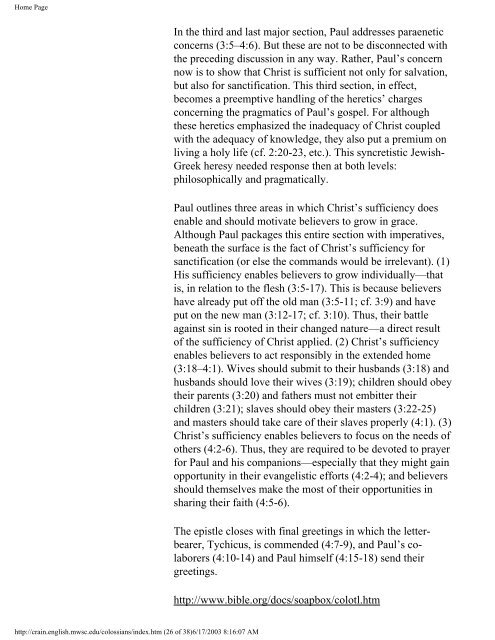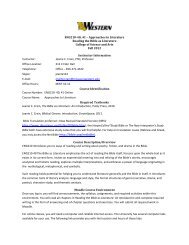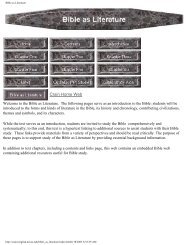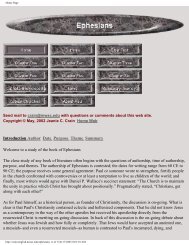Introduction to Colossians: Authorship, Date, Audience - Crain Home
Introduction to Colossians: Authorship, Date, Audience - Crain Home
Introduction to Colossians: Authorship, Date, Audience - Crain Home
You also want an ePaper? Increase the reach of your titles
YUMPU automatically turns print PDFs into web optimized ePapers that Google loves.
<strong>Home</strong> Page<br />
http://crain.english.mwsc.edu/colossians/index.htm (26 of 38)6/17/2003 8:16:07 AM<br />
In the third and last major section, Paul addresses paraenetic<br />
concerns (3:5–4:6). But these are not <strong>to</strong> be disconnected with<br />
the preceding discussion in any way. Rather, Paul’s concern<br />
now is <strong>to</strong> show that Christ is sufficient not only for salvation,<br />
but also for sanctification. This third section, in effect,<br />
becomes a preemptive handling of the heretics’ charges<br />
concerning the pragmatics of Paul’s gospel. For although<br />
these heretics emphasized the inadequacy of Christ coupled<br />
with the adequacy of knowledge, they also put a premium on<br />
living a holy life (cf. 2:20-23, etc.). This syncretistic Jewish-<br />
Greek heresy needed response then at both levels:<br />
philosophically and pragmatically.<br />
Paul outlines three areas in which Christ’s sufficiency does<br />
enable and should motivate believers <strong>to</strong> grow in grace.<br />
Although Paul packages this entire section with imperatives,<br />
beneath the surface is the fact of Christ’s sufficiency for<br />
sanctification (or else the commands would be irrelevant). (1)<br />
His sufficiency enables believers <strong>to</strong> grow individually—that<br />
is, in relation <strong>to</strong> the flesh (3:5-17). This is because believers<br />
have already put off the old man (3:5-11; cf. 3:9) and have<br />
put on the new man (3:12-17; cf. 3:10). Thus, their battle<br />
against sin is rooted in their changed nature—a direct result<br />
of the sufficiency of Christ applied. (2) Christ’s sufficiency<br />
enables believers <strong>to</strong> act responsibly in the extended home<br />
(3:18–4:1). Wives should submit <strong>to</strong> their husbands (3:18) and<br />
husbands should love their wives (3:19); children should obey<br />
their parents (3:20) and fathers must not embitter their<br />
children (3:21); slaves should obey their masters (3:22-25)<br />
and masters should take care of their slaves properly (4:1). (3)<br />
Christ’s sufficiency enables believers <strong>to</strong> focus on the needs of<br />
others (4:2-6). Thus, they are required <strong>to</strong> be devoted <strong>to</strong> prayer<br />
for Paul and his companions—especially that they might gain<br />
opportunity in their evangelistic efforts (4:2-4); and believers<br />
should themselves make the most of their opportunities in<br />
sharing their faith (4:5-6).<br />
The epistle closes with final greetings in which the letterbearer,<br />
Tychicus, is commended (4:7-9), and Paul’s colaborers<br />
(4:10-14) and Paul himself (4:15-18) send their<br />
greetings.<br />
http://www.bible.org/docs/soapbox/colotl.htm






![[38cb1273][0][sourcelist][1][0] - Crain Home](https://img.yumpu.com/2168350/1/190x245/38cb12730sourcelist10-crain-home.jpg?quality=85)